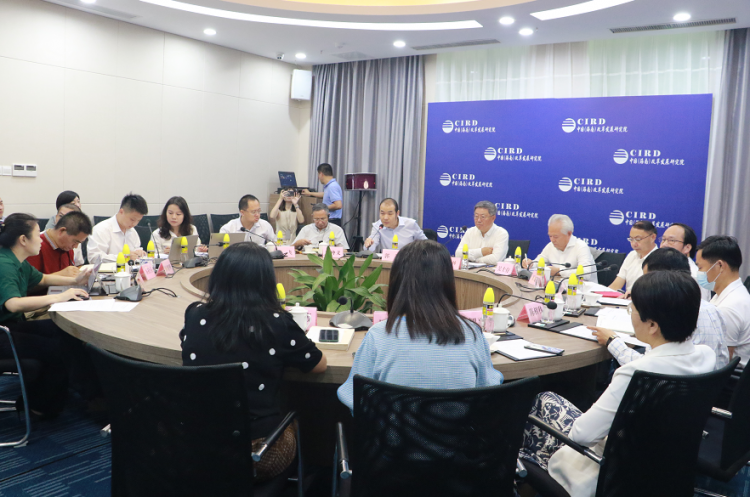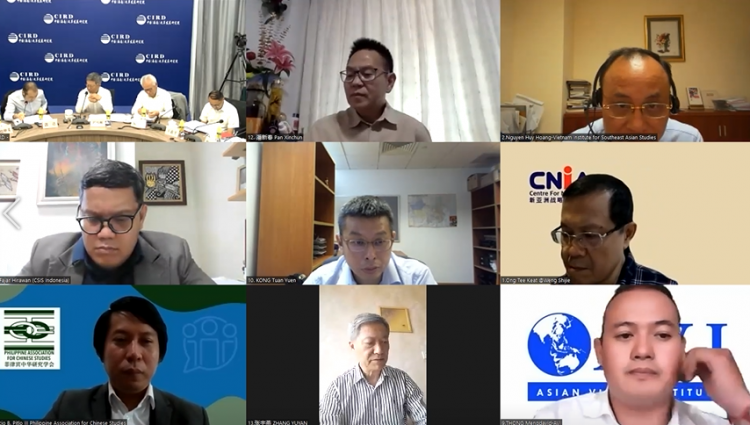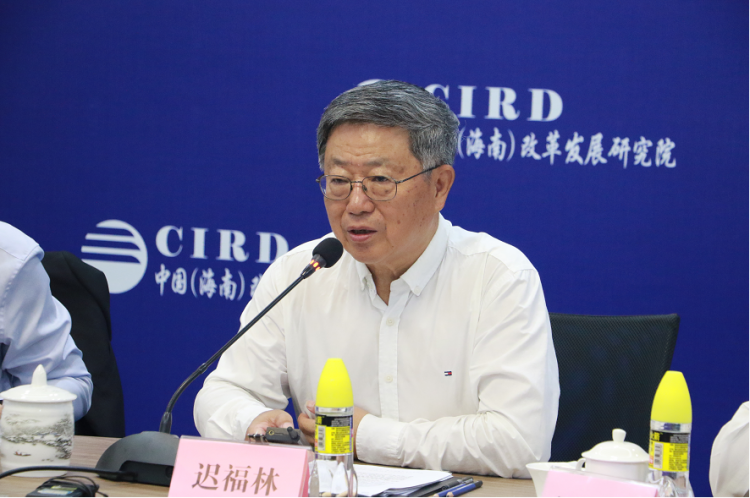The 2nd working meeting of ASEAN-HNFTP Think Tank Network was held on how to play a better role of intellectual support in cooperation and exchangesThe 2nd Working Meeting of ASEAN-HNFTP Think Tank Ne
For the purpose of facilitating the deepening of trade and cooperation between ASEAN and China, and of better leveraging the role of Hainan FTP as a strategic hub, the ASEAN-HNFTP Think Tank Network(hereinafter referred to as the Network), which was jointly initiated on April 21 by 17 think tanks from nine countries, held its 1st working meeting on May 13, 2022.

On September 12, the Network held its 2nd work meeting with participation of 16 representatives from think tanks of 7 countries in the region including China, Singapore, Vietnam, Indonesia, Malaysia, Thailand and Cambodia, focusing exchange and discussion on how to use Hainan Free Trade Port (hereinafter referred to as HNFTP) as a platform to facilitate Chinese enterprises' investment and cooperation in ASEAN, and how to bring the intellectual support role of the Network into fuller play.

1.Adapting to the general trend and leveraging joint efforts of think tanks to promote Chinese enterprises' investment and cooperation in ASEAN
At present, the world is confronted with with a stark contradiction between development and conflict. In this context, the construction of HNFTP should aim at fully using its geographical and opening-up advantages, enabling it to play a pivotal role in facilitating cooperation and communication between China and ASEAN at a higher level and in broader areas, and effectively connecting these two most dynamic markets, so as to conveniently and pragmatically advance the economic integration in the region. This meeting focused on exchanging ideas and discussing on how to adapt to the general trend to bring the role of HNFTP as an important platform into full play in facilitating investment and cooperation between China and ASEAN countries.
Chi Fulin, President of China Institute for Reform and Development (hereinafter referred to as CIRD) and President of Hainan Institute for Free Trade Port Studies, emphasized the following: First, a core objective of constructing the HNFTP is to enable it to become an important hub of comprehensive cooperation between China and ASEAN and an intersection of these two markets. So HNFTP should play a better role in facilitating Chinese enterprises' investment and cooperation in ASEAN. Second, the think tank network should provide intellectual support for Chinese enterprises’ investment and cooperation in ASEAN. Data from a survey of Chinese companies' willingness to invest abroad shows that 56% of the surveyed are planning to enter the ASEAN market; and 60% have a desire to expand their investment and cooperation in ASEAN in the next 12 months, which indicates that this demand is still growing. Third, the think tank network should play a full role in helping build institutionalized platforms for facilitating Chinese enterprises to invest in ASEAN.
Ong Tee Keat, Chairman, Center for New Inclusive Asia, Malaysia, pointed out that, after IPEF’s implementation, the US is sure to press ASEAN countries to take sides by imposing its standards and rules upon them. Therefore, he suggested that joint sand-table exercises should be conducted to predict possible risks for RCEP.
Zhang Yuyan, Director, Chinese Academy of Social Sciences’ Institute of World Economics and Politics, pointed out that IPEF may well seriously impact China-ASEAN relations. And it is crucial to prevent fragmentation of cooperation in the Asia-Pacific region. RCEP should be the center in promoting cooperation in the Asia-Pacific region as well as exchanges and cooperation between ASEAN and HNFTP.
Nguyen Huy Hoang, Director General, Vietnamese Academy of Social Sciences’ Institute for Southeast Asian Studies, noted that, Hainan as China's gateway to Southeast Asia and a strategic hub connecting China and Southeast Asia, has an important role to play in promoting interconnectivity between China and ASEAN. However, mutual understanding between China and ASEAN should be further enhanced in order to strengthen the connectivity between ASEAN and Hainan.
Fajar B. Hirawan, Head of the Economics Department, Centre for Strategic and International Studies, Indonesia, pointed out that industrialization, infrastructure connectivity and upgrading skills of the workforce are Indonesia's top three priorities, in which China has provided significant support. In order to further explore the potential in cooperation between ASEAN and HNFTP, he suggested further strengthening intergovernmental cooperation, especially cooperation in digital government building and skill training.
THONG Mengdavid, Research Associate at Mekong Center for Strategic Studies, Asian Vision Institute, said that ASEAN needs to develop a regional growth model featuring mutual understanding and mutual support, and that enhancing trade cooperation between China and ASEAN calls for strengthening interconnectivity of logistics and people-to-people exchanges.
Lucio B. Pitlo III, Member of Board of Directors, Philippine Association for Chinese Studies, pointed out that the Philippines welcomes investment from Chinese enterprises, especially in agriculture. He hoped that China and ASEAN countries can set up more joint ventures in the agricultural sector and further deepen cooperation in market opening, infrastructure interconnectivity, and science and technology.
Guo Yanjun, Director, Institute of Asian Studies, China Foreign Affairs University, noted that HNFTP with its unique geographical and policy advantages in facilitating China-ASEAN cooperation can set a shining example for China’s other provinces to participate in cooperation with ASEAN. Constructive interactions between HNFTP and Hong Kong are very important for deepening China-ASEAN cooperation. It is necessary to conduct in-depth research on how to construct corporate headquarters bases in HNFTP and how to promote constructive interactions between HNFTP and Hong Kong.
2. Take concrete actions to set up institutionalized platforms for providing intellectual support for Chinese enterprises to invest in ASEAN
What are the needs of different ASEAN member states’ industries to attract Chinese enterprises for investment and cooperation? How can the unique role of HNFTP in promoting China-ASEAN cooperation be brought into full play? What are the policy needs for facilitating ASEAN enterprises to expand their share in China’s large market via HNFTP? Around these questions, participants of the meeting discussed and exchanged views focusing on how the Network can play its due role in facilitating Chinese enterprises' investment and cooperation in ASEAN and ASEAN enterprises’ expansion of their share in China’s large market.
Ong Tee Keat put forward the following: First, joint research of the Network should be conducted in a more open manner in order to involve participation of entrepreneurs and representatives of government agencies. Second, joint studies should be done to draw on not only successful experience but also lessons of failure from FTPs across the world. Third, unique features of different think tanks in ASEAN should be taken into consideration in joint research in order to improve effectiveness of research findings.
Chi Fulin proposed that the Network should aim at building up institutionalized exchange platforms for facilitating Chinese enterprises' investment and cooperation in ASEAN by co-organizing events like Forum on ASEAN-HNFTP Cooperation and Exchanges and by jointly running capacity building training seminars for SMEs from China and ASEAN. In addition, joint efforts should be made to deepen exchanges among member think tanks through mutual visits when conditions allow.
Zhang Yuyan suggested building platforms for disseminating joint research results such as a website for the Network in order to enhance their social influence. Moreover, the Network’s annual high-level forum and annual academic report should be cultivated into academic brands.
Li Mingjiang, Associate Professor, S. Rajaratnam School of International Studies, Nanyang Technological University, Singapore, proposed to involve enterprises and industry associations in joint research of the Network because the key to promoting Chinese enterprises' investment in ASEAN lies in them. He also suggested that interntional economic and political situations should be one of the joint research topics because these are enterprises’ major concerns. Online meetings to share research information and findings mainly among member think tanks should be held in a timely manner. However, non-member think tanks or other research institutes can also be invited to these meetings to share their research reports according to the actual needs of cooperative research and discussion within the Network.
Ngeow Chow Bing, Director, Institute of China Studies, University of Malaya, proposed to strengthen the Network’s cooperation with the ASEAN Secretariat and to take ASEAN as a whole in conducting cooperative research on cooperation between ASEAN and HNFTP. Different member think tanks should be invited to participate in different joint research projects according to their focus in order to improve the quality of research results.
Wu Shicun, Chairman, Board of Directors of China-Southeast Asia Research Center on the South China Sea, proposed to organize the Global Free Trade Ports Development Forum as an independent event from the Annual Conference of the Boao Forum for Asia in order to enhance its international influence. He also suggested organizing online training programs in view of the current COVID-19 situation, such as capacity building training programs for enterprises and government officials on corporate cross-border investment, marine environmental protection and marine governance. And exchange of visiting scholars among member think tanks should be also organized at an appropriate time.
Kong Tuan Yuen, Research Fellow, East Asian Institute, National University of Singapore, suggested that member think tanks of the Network should be encouraged to initiate joint research projects, based on their focus of attention regarding the cooperation between ASEAN and HNFTP. He also proposed to strengthen the linkage of the Network with track 1 dialogue between China and ASEAN so as to elevate the influence and actual results of the Network’s operations.
Wang Huiping, President, Hainan Provincial Academy of Social Sciences, noted that, in the context of complex and grim international situation, strengthening cooperation between China and ASEAN and establishing mechanisms for enhancing their mutual trust and exchanges are conducive to promoting economic recovery and maintaining the economic order in the Asia-Pacific region, thus playing an irreplaceable role in global economic development. Therefore, he proposed to attract enterprises to participate in joint research of the Network on how to promote RCEP’s development and post-pandemic economic recovery.
Pan Xinchun, Vice President and Secretary General of China Oceanic Development Foundation, pointed out that, bringing into full play the role of HNFTP as a headquarters base for Chinese enterprises to invest in ASEAN requires clarifying supportive polices and establishing a service system. Therefore, he emphasized that, first of all, guidelines should be promulgated to attract enterprises to set up their headquarters in Hainan, and secondly, an English version of Hainan Free Trade Port policies should be available for overseas enterprises.
 大阳城集团72138
大阳城集团72138
 Scan official wechat
Scan official wechat Scan official wechat
Scan official wechat